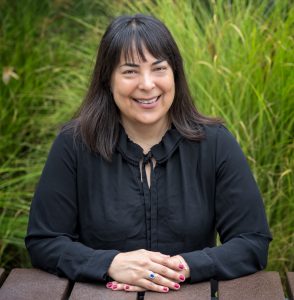Loretta Ramirez
Dr. Loretta Ramirez
California State University, Long Beach
Chicano & Latino Studies Department
1250 Bellflower Blvd.
Tel. (562) 985-7531
Fax (562) 985.4631
E-Mail: Loretta.Ramirez@csulb.edu
Dr. Loretta Ramirez is Assistant Professor of Latinx Rhetoric & Composition. Her research includes historical rhetorics, cultural rhetorics, multimodal rhetoric, art history, archival methodologies, decolonial theory, Chicana literature, creative writing, and critical composition pedagogy. In 2020, she was awarded the Scholars for the Dream Award by the Conference on College Composition & Communication.
Her first book, The Wound and the Stitch: A Genealogy of the Female Body from Medieval Iberia to SoCal Chicanx Art (Penn State UP, 2024) offers a historical rhetorical genealogy informed by insights Dr. Ramirez has gained while teaching within a multi-disciplinary ethnic studies department wherein she engages in Chicana rhetorical studies, decolonial theory and methodology, feminist studies, art history, and critical pedagogy. The Wound and the Stitch specifically examines Chicana rhetoric that focuses on the phenomenon of woundedness and a stitching together of fragmented selves. The book maps a historical genealogy by linking late-medieval female Iberian devotional rhetoric to expressions of fragmented female bodies in contemporary Chicana self-representational strategies. Dr. Ramirez traces construction of such rhetoric by interweaving connections between this Iberian genealogy and Mesoamerican concepts of securing stability during lived turmoil. The goal of this historical rhetorical genealogy is to claim that a ubiquitous form of Chicana self-representation strategies, notably manifested in late-twentieth-century Californian print media and art, positions woundedness to generatively express Chicana realities and transform the self.
Loretta is currently preparing for publication her second book, Get Back to Where You Once Belonged: A Chicana-Apache Professor’s Autoethnography on Racial and Rhetorical Belongings. Recalling second-wave feminist notions that the personal is political, Get Back employs autoethnography to reflect on intersectionality as impetus for inquiry & social confrontation within ethnic studies discourses & decolonial frameworks. Loretta’s story offers a personal lens to detect biopolitical forces that curtail Chicanx wellness by exploring her family as a fragment of a community ruptured by the Vietnam-American War. She traces these wounds to her sense of racial & rhetorical unbelonging as a first-generation student & professor whose academic pathway results from wartime uprooting.
Publications:
“(Re)membering Indigeneity in Historical Cultural Rhetorics.” In The Cambridge History of Rhetoric. Gen eds. Rita Copeland and Peter Mack. Vol. 5: Modern Rhetoric after 1900. Eds. Daniel Gross, Steven Mailloux, and LuMing Mao. Cambridge UP, 2025. (under contract)
The Wound and the Stitch: A Genealogy of the Female Body from Medieval Iberia to SoCal Chicanx Art. Penn State UP, 2024 (forthcoming).
“Digging the Archives in Composition Stretch Programs: Reclamation of Historical Rhetorics to Support Chicanx Emotions of Belonging.” College Composition and Communication, vol. 74, no. 2, February 2024, (forthcoming).
“Archival Quest: Research Writing Pedagogies to Recover Historical Rhetorics that Centralize Latinx Voice & Inquiry.” Composition Studies, vol. 51, no. 1, Spring 2023, pp. 91-110.
“Self-Loving in the Epidemic Years: Carmen Machado’s Rhetoric of Woundedness.” Journal of Lesbian Studies, special issue of Chicana Lesbians: Re-Engaging the Iconic Text, “The Girls Our Mothers Warned Us About,” edited by Stacy Macias and Liliana González, vol. 26, 2023, DOI: 10.1080/10894160.2023.2178727
“Unmaking Colonial Fictions: Cherríe Moraga’s Rhetorics of Fragmentation and Semi-ness.” Rhetoric Review, vol. 41, no. 3, 2022, pp. 168-183, DOI: 10.1080/07350198.2022.2077017
Education:
- Ph.D. in English with Graduate Certificate in Visual Studies.
University of California, Irvine
Focus: Historical Cultural Rhetorics, Visual Studies, Chicana Literature, Decolonial Theory, Critical Composition Pedagogy - M.A. in English
University of California, Irvine
Focus: Chicana Rhetoric, Critical Composition Pedagogy - M.A. in Art History
California State University, Long Beach
Focus: Medieval Spain, Devotional Art, Female Patronage - M.A. in English
Loyola Marymount University
Focus: Creative Writing, Narrative Theories - B.A. in Anthropology
Stanford University
Focus: Political Anthropology
Classes Taught:
CHLS 104A: Composition I
CHLS 104B: Composition II
CHLS 119: Introduction to Racial and Ethnic Studies (Fulfills GE Category F, Ethnic Studies)
CHLS 360: Chicano & Latino Rhetoric (Fulfills the Graduation Writing Assessment Requirement)
CHLS/ENGL 370: Chicano & Latino Literature (Fulfills the Graduation Writing Assessment Requirement)
CHLS 420: Chicano Heritage in Arts of Southwest
CHLS 411/511: Archival Quest: Reclaiming Latinx Rhetoric (Fulfills the Graduation Writing Assessment Requirement; fulfills GE Category C, Upper Division, Humanities)
CHLS 412A/512A: Centralizing Latinx Narratives: Seminar in Writing Self–Autoethnography
CHLS 498: Senior Colloquium
WGSS/ENGL 442: Sexing Chicana Literature
Teaching Subjects:
